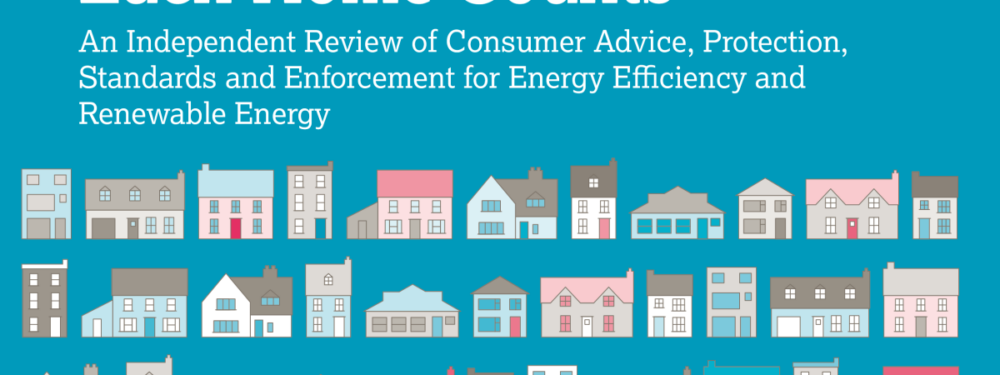
PAS 2035 and the impact on the Each Home Counts Review.
In 2015, the government commissioned Dr Peter Bonfield to chair a review of UK home energy efficiency measures and renewable energy measures, standards, enforcement, advice and protection. The idea of the review was to cover issues pertaining to the following questions:
• Is there any framework in place to support the decisions of consumers prior to an installation of an energy-efficient device or system?
• Is there any way to ensure the correct products are fitted to the right properties, and in the proper manner?
• How can the government ensure that sub-standard work is dealt with effectively – and what arrangements are in place to audit, check for compliance, and if needs be sanction poor-quality contractors?
To achieve this, Dr Bonfield and his team sought the views of hundreds of organisations: from trade bodies to energy providers, manufacturers to installers and trainers to consumer groups. No stone was left unturned.
The findings were eventually published in December 2016, in a report entitled Each Home Counts.
Reinforcing the report
While 2015 might seem like a pre-Brexit referendum distant memory, the sentiments of the Each Home Counts review remain firmly intact. A new specification introduced in June 2019, known as PAS 2035, has effectively reinforced what was outlined in Dr Bonfield’s report.
PAS 2035 pertains to retrofit standards and is designed to clarify the responsibilities of those in retrofit roles and the qualifications they much hold prior to the commencement of any physical retrofitting installation. Retrofit Academy adheres to all PAS 2035 protocols as per the transitional arrangements for the specification.
A 19-month transitional period will run until the end of January 2021, which gives time for the UK Accreditation Service (UKAS) to accredit certification bodies. This transitional period will also provide certification bodies requisite time to certify registered businesses as fit to perform retrofitting for environmental purposes.
What this means for the consumer
Ultimately, PAS 2035 is a fine-tuned output of the initial Each Home Counts review. By establishing a quality mark for domestic retrofits which is backed up by a consumer charter, an industry-standard code of conduct and a technical standards framework, PAS 2035 means that the landscape of achieving energy efficiency will be drastically improved for the consumer.
Why PAS 2035 is important
In the construction industry, complaints pertaining to the quality of a build tend to lie with below-par workmanship. However, the retrofitting of buildings brings with it a completely different set of deeper issues. Lack of communication, inappropriate initial building designs and incorrect approaches have all led to retrofitting faults in recent years. This, of course, has led to a complete overhaul of the way we make buildings more energy-efficient.
Each Home Counts and PAS 2035: how they complement each other
The Each Home Counts report recognised a need to support consumers and to deliver a standard set of rules regarding the retrofitting of homes for greater energy efficiency. With the right framework in place, this means that the overall plan to retrofit homes becomes much easier for everyone involved: consumers feel protected, contractors have a framework to follow and a regulatory body ensures the standardisation of energy efficiency improvement practices.
While Each Home Counts serves as a blueprint of sorts, PAS 2035 acts as the overarching document which helps to co-ordinate the activities of those in roles which are (for the most part) self-explanatory: retrofit assessors, retrofit advisors, retrofit designers, retrofit installers and retrofit evaluators.
Qualifications and competency
Under the new specifications, new roles are created that people can play in the retrofit process. Each role has a related qualification, and people must hold that in order to be deemed competent. Retrofit Advisors will need to hold the City & Guilds Level 3 Award in Energy Awareness. Retrofit Coordinators must hold the Level 5 Diploma in Retrofit Coordination and Risk Management. Other roles will require a Level 3 top-up qualification in the Energy Efficiency and Retrofit of Traditional Buildings.
The beginning of a journey
PAS 2035 is merely the start of a long journey of development, resulting in a continuous improvement in retrofit standards. At the end of the 19-month transition period, a review of PAS 2035 will take place, and the BSI Retrofit Standards Group are already planning on broadening the scope of the specification. Maintenance and repair are likely to be major factors in any changes to documentation, alongside a much more detailed look at carbon emissions in the household.
Both Each Home Count and PAS 2035 have been important documents regarding improving the quality of work and helping the UK adopt a more sustainable approach. Without such an approach, the UK will struggle to make homes more energy-efficient and could potentially fail to meet its current climate change targets for carbon reduction.
